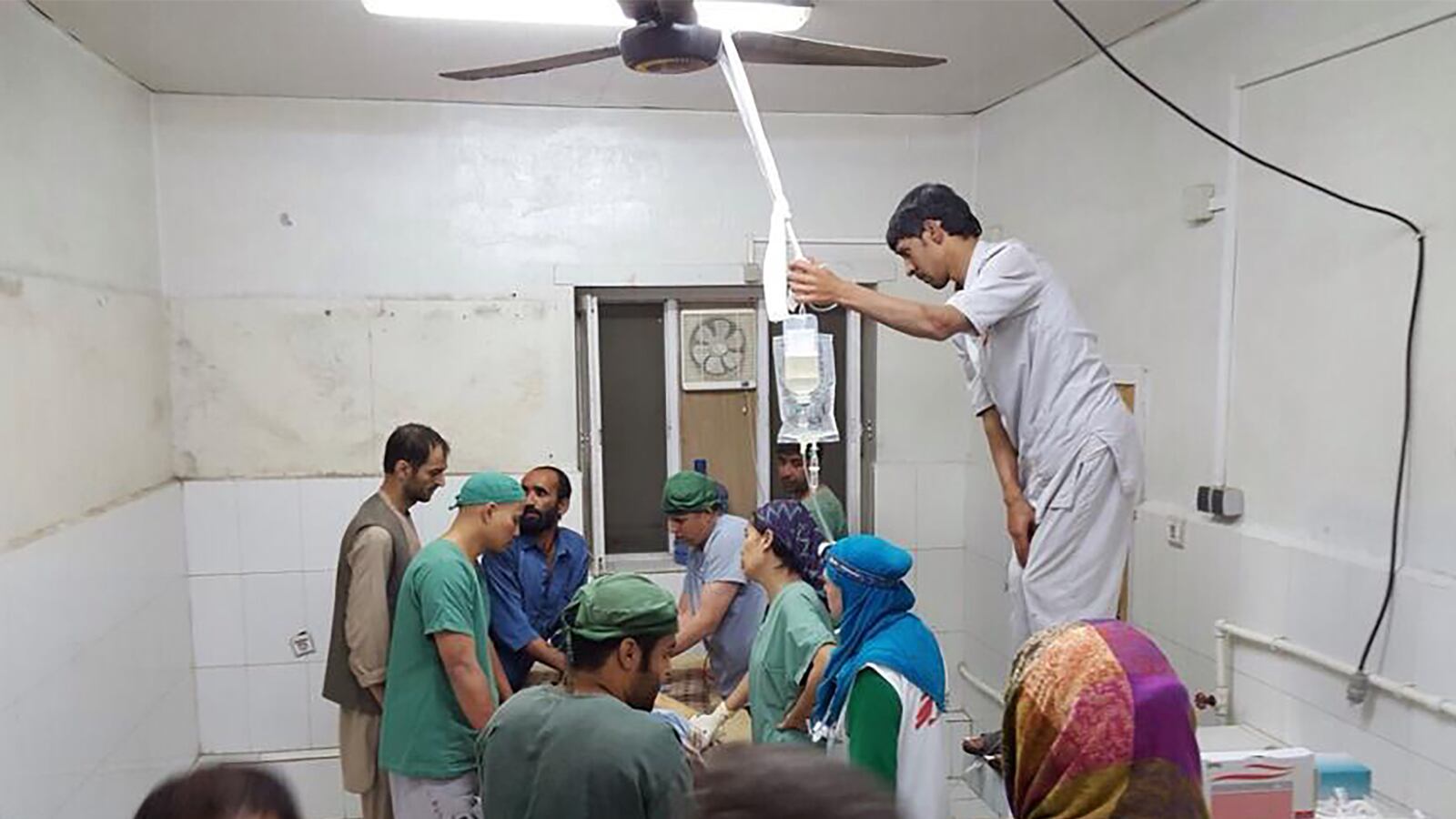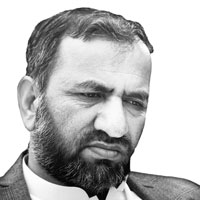KABUL — A U.S. gunship bombed a hospital run by Médecins Sans Frontières / Doctors Without Borders (MSF), early Saturday morning, killing at least 19 people, including three children, according to MSF. The Americans had been flying close air support as Afghan government troops continue their effort to re-take the city of Kunduz, which fell to the Taliban last week almost without a shot.
Muhammad Ajami, 35, tells The Daily Beast that he was talking to his 17-year-old brother Jamil on the phone at the time of the airstrike. Earlier in the evening Jamil had been injured during the fighting and admitted to the MSF clinic, the only operational hospital-type facility in the city.
“This was about 2:00 a.m.,” said Muhammad. “Jamil was telling me he wanted me to get him and take him home, there was a lot of bombing and shelling in the city. Then there was a big bang, and my brother dropped his phone. The last words I heard were ‘Move to the basement! Move to the basement!' And crying and crying.”
MSF issued a statement “condemning in the strongest possible terms the horrific bombing of its hospital in Kunduz, which was full of staff and patients.” Twelve MSF staff members were confirmed dead after the trauma center “was hit several times during sustained bombing and was very badly damaged.”
“This attack is abhorrent and a grave violation of International Humanitarian Law,” said Meinie Nicolai, MSF president. “We demand total transparency from Coalition forces. We cannot accept that this horrific loss of life will simply be dismissed as ‘collateral damage.’”
MSF has decades of experience working in war zones and had notified “all parties to the conflict, including in Kabul and Washington,” of the precise GPS coordinates of its facilities, including the hospital, guest house, office and an outreach unit in a village northwest of Kunduz. The hospital, according to MSF, had been there for four years. Those coordinates had been communicated repeatedly, most recently on September 29 after the Taliban took the city, according to another MSF statement.
German troops have historically been stationed in Kunduz province, with U.S. forces providing air support of them. That is, compared to other parts of Afghanistan, the U.S. military had limited experience with combat air operations in that area, even now, 14 years into the war.
But German troops have since left, replaced with U.S. trainers assigned to guide their Afghan counterparts.
Earlier this week, the Taliban launched an aggressive campaign for the northern Afghan city for the first time since 2001. The Taliban attacked near the airport where U.S. troops were stationed, leading to the first U.S. airstrike there just days ago. As the Taliban consolidated its grip on the city, the U.S. launched two more strikes before today’s attack on the hospital.
"Overnight I learned of a tragic incident involving a Doctors without Borders hospital in Kunduz, Afghanistan, that came under fire," U.S. Secretary of Defense Ash Carter said in a statement. "The area has been the scene of intense fighting the last few days. U.S. forces in support of Afghan Security Forces were operating nearby, as were Taliban fighters. While we are still trying to determine exactly what happened, I want to extend my thoughts and prayers to everyone affected. A full investigation into the tragic incident is underway in coordination with the Afghan government."
A U.S. senior defense official told The Daily Beast in Washington that a U.S.-manned AC-130 gunship “was called in to return fire against a Taliban position that was firing on U.S. Special Forces advising Afghan Special Forces” when the attack began somewhere near the hospital.
But the official could not say how close that fighting position was to the hospital or whether the United States did indeed know the hospital coordinates beforehand. Defense officials also could not say how long the attack went on. The AC-130, however, has video capability, which means the U.S. military may have a recording of the incident.
Photos of damage done by bombing of #MSF #Kunduz hospital + staff treating patients in parts still standing ©MSF pic.twitter.com/hKOBIyLttI
— Doctors w/o Borders (@MSF_USA) October 3, 2015The U.S. military is sending a one-star general to Kunduz investigate, the official said.
What he will find there is a battle still very much in progress, despite repeated Afghan government claims that the city has been retaken.
A group of Afghan journalists who were able to escape from Kunduz on September 28 say they are extremely worried about their families’ lives. A young radio reporter who arrived in Kabul from Kunduz told The Daily Beast, “My house and whole family are stuck in the city, where right now Afghan forces and Taliban bullets are crossing over my house. Last night a big mortar hit the wall of my house. There is no water, no food, or anything left at home.”
Another Kunduz resident, an Afghan elder of Uzbek ethnicity named Haji Juma Qul, told The Daily Beast by telephone that the city is still “pretty much disrupted by the Taliban.” “We are facing shortages of food and people can be killed, looted or raped at any time.”
Qul, a carpet dealer, said the MSF hospital was burning in the night. “First we suffer from a warlord, then the last five days from the Taliban, and now from the U.S. Air Force,” he said by phone. “We love and trust our Afghan National Army, and they are trying their best, but the Taliban are showing tough resistance.”
Qul, obviously worried about his shop, said he believed the Taliban would kill and loot, but the local warlords “also are waiting their chance to loot some more.”
“I have a young girl at home and I am worried about what happens to her,” Qul said over the phone. “I am not worried if I get killed by the Taliban, but I worry about sexual assaults on female members of our family by the Taliban or by the warlord’s militias.”
Qul, like many in Kunduz, said he thought it was “stupid” to believe President Ashraf Ghani’s assurances that he would protect the people there at any cost. “I should not trust President Ghani’s words,” he said.
A Western diplomat in Kabul told The Daily Beast that U.S. forces seem to be focused more on the south of Afghanistan than they are on northern areas like Kunduz. The diplomat said Ghani has found himself isolated as he tries to marshal resources to take back the city. “No one listens to him and everyone—his rivals, the media—blames him for not being aggressive enough against the Taliban, and that makes his position weaker than ever,” said the diplomat.
“If the Afghan National Army does not push back the Taliban in the north,” the diplomat said, “then ex-jihadist warlords will start their own anti-Taliban fight, and that will have serious consequences.”
Reporting by Nancy Youssef from Washington.







